PHUKET: Workers at a shelter for women and children north of Phuket have been warding off would-be human traffickers who will sell the Rohingya now in care if given a chance.
The women and children, who arrived in Thailand on boats from Burma this week, are also in need of food and other items that the centre does not have the budget to supply.
When we visited yesterday with a load of eggs and powdered baby's milk, as well as clothes and snacks, Phuketwan was asked to make an appeal for help.
Two of the children were reported to have fallen ill today from eating too much. Rohingya voyagers usually have just dried rice, reconstituted with a little water, to live on while at sea.
Beds are filling up at the Phang Nga Shelter, where women and children are being taken in as they arrive. More boats are expected.
Thousands of Rohingya have landed on the Andaman coast over the past few years and mostly been delivered into the hands of people traffickers, often by people who should be protecting them.
Plenty of genuine well-wishers visited the Phang Nga centre yesterday with clothes, toys and essential supplies.
But there were also visitors who volunteered to take away as many as six people, and a frequent request was for one or two of the children.
This is evidence of how widespread people smuggling - one of the most abhorrent of all human activities - has become on the Andaman coast north of Phuket.
Thailand's switch from the inhumane ''pushback'' policy that led to scores of deaths at sea before it was exposed by a Phuketwan team in 2009 to the ''help on'' policy has unintentionally encouraged people smuggling.
The military often ''helps on'' boats into the arms of people traffickers based on Thailand's Andaman coast who charge 50,000 baht to 60,000 baht to smuggle Rohingya across the border into Malaysia.
The brokers are often people with connections to the Rohingya, in some cases locals who speak Bengali and can act as interpreters.
The workers at the Phang Nga care centre need a translator and had to rely on the local police to suggest one.
A succession of other callers offering to take women or children into their care made it apparent yesterday that many opportunists along Thailand's Andaman coast realise there is money to be made selling humans.
For some, it is already an established source of income. Others would like to make a start.
With local authorities, outlaws in the military and police and wealthy locals involved, workers at the refuge were learning quickly about who not to trust.
The genuine visitors were generous and the children especially, having voyaged south from Rakhine state in just one set of clothes, enjoyed themselves.
Toys are something they were probably seeing for the first time, given their desperate hand-to-mouth existence in Burma.
We watched as some of the children tried on several outfits and made changes of clothing over and over in the space of a couple of hours.
There was plenty of food available to eat yesterday but the shelter has no budget to feed 60 hungry women and children and needs help.
Meanwhile, the future of these women and children - along with others yet to arrive and hundreds more freed from transit camps - has yet to be decided by Thailand's Government.
Donations of all kinds are welcome, but especially food and water. Donors are reminded that as Muslims, their religion does not allow them to eat pork.
There's an urgent need for mobile toilets as the centre is not equipped for large numbers of people.
For those who can help, contact Khun Poo by calling 089 9736134. The address is Phang Nga Shelter for Children and Families, 560/122 Moo 5, Khukkhak, Takuapa.
For motorists coming from Phuket, the shelter is on a corner through Khukkhak on the left, a couple of hundred metres past the Patrol Boat Tsunami memorial.
The women and children, who arrived in Thailand on boats from Burma this week, are also in need of food and other items that the centre does not have the budget to supply.
When we visited yesterday with a load of eggs and powdered baby's milk, as well as clothes and snacks, Phuketwan was asked to make an appeal for help.
Two of the children were reported to have fallen ill today from eating too much. Rohingya voyagers usually have just dried rice, reconstituted with a little water, to live on while at sea.
Beds are filling up at the Phang Nga Shelter, where women and children are being taken in as they arrive. More boats are expected.
Thousands of Rohingya have landed on the Andaman coast over the past few years and mostly been delivered into the hands of people traffickers, often by people who should be protecting them.
Plenty of genuine well-wishers visited the Phang Nga centre yesterday with clothes, toys and essential supplies.
But there were also visitors who volunteered to take away as many as six people, and a frequent request was for one or two of the children.
This is evidence of how widespread people smuggling - one of the most abhorrent of all human activities - has become on the Andaman coast north of Phuket.
Thailand's switch from the inhumane ''pushback'' policy that led to scores of deaths at sea before it was exposed by a Phuketwan team in 2009 to the ''help on'' policy has unintentionally encouraged people smuggling.
The military often ''helps on'' boats into the arms of people traffickers based on Thailand's Andaman coast who charge 50,000 baht to 60,000 baht to smuggle Rohingya across the border into Malaysia.
The brokers are often people with connections to the Rohingya, in some cases locals who speak Bengali and can act as interpreters.
The workers at the Phang Nga care centre need a translator and had to rely on the local police to suggest one.
A succession of other callers offering to take women or children into their care made it apparent yesterday that many opportunists along Thailand's Andaman coast realise there is money to be made selling humans.
For some, it is already an established source of income. Others would like to make a start.
With local authorities, outlaws in the military and police and wealthy locals involved, workers at the refuge were learning quickly about who not to trust.
The genuine visitors were generous and the children especially, having voyaged south from Rakhine state in just one set of clothes, enjoyed themselves.
Toys are something they were probably seeing for the first time, given their desperate hand-to-mouth existence in Burma.
We watched as some of the children tried on several outfits and made changes of clothing over and over in the space of a couple of hours.
There was plenty of food available to eat yesterday but the shelter has no budget to feed 60 hungry women and children and needs help.
Meanwhile, the future of these women and children - along with others yet to arrive and hundreds more freed from transit camps - has yet to be decided by Thailand's Government.
Donations of all kinds are welcome, but especially food and water. Donors are reminded that as Muslims, their religion does not allow them to eat pork.
There's an urgent need for mobile toilets as the centre is not equipped for large numbers of people.
For those who can help, contact Khun Poo by calling 089 9736134. The address is Phang Nga Shelter for Children and Families, 560/122 Moo 5, Khukkhak, Takuapa.
For motorists coming from Phuket, the shelter is on a corner through Khukkhak on the left, a couple of hundred metres past the Patrol Boat Tsunami memorial.

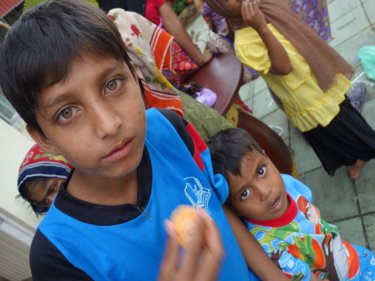






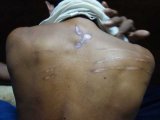
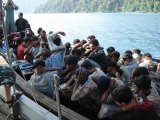

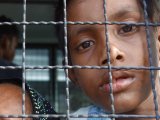
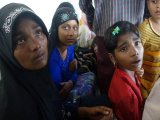
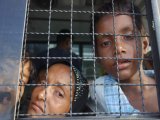
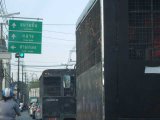
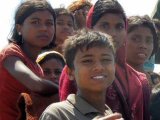
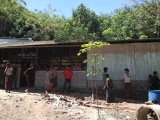
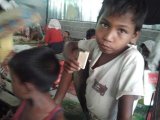
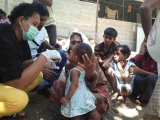
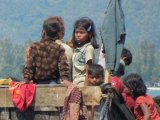
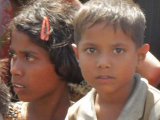
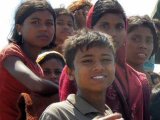
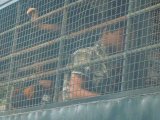
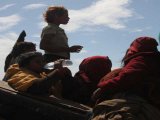
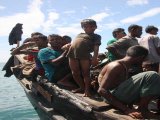
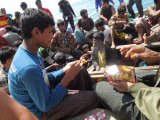
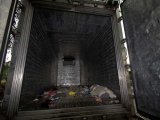
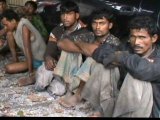
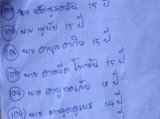
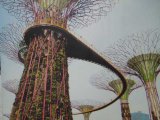



The UN should step in and force the Thai Government to set up proper Refugee camps - controlled by UN staff. If the Thai Government refuse then two things should happen:
1. They should remind the Thais of the help they received when in need 2004 Tsunami
2. Full blanket trade embargo - cut off their money and the tune will be entirely different.
Posted by Graham on January 20, 2013 16:05
Editor Comment:
The UN is not known for force, Graham, and the link you supplied is a little short on facts. Help in 2004 came from many sources, not just the UN. Only bullies remind people of alleged ''favors.'' There has never been evidence of ''pushbacks'' occurring before December, 2008. I'd file that link under spurious guesswork. Why waste time reading stuff that is produced by non-professionals at a distance from events?